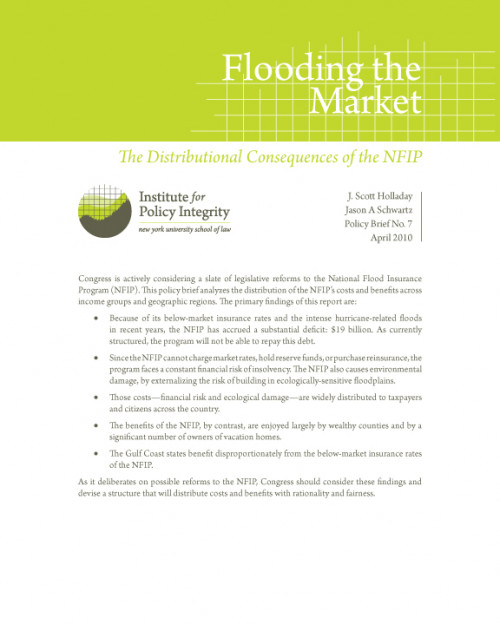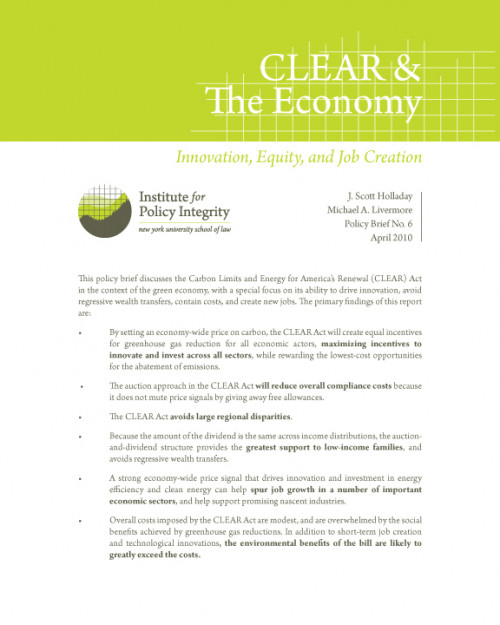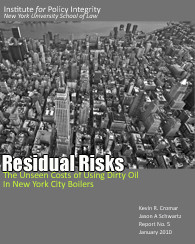-
Responses to Policy Integrity fuel efficiency public comments
Today, federal agencies issued new regulations on fuel efficiency standards—for the first time, limiting the amount of greenhouse gas emission allowed from cars and trucks.
-
Comments on FCC Future of Media Project
Today marks the deadline for comments on the Federal Communication Commission’s Examination of the Future of Media and Information Needs of Communities in a Digital Age, a task force dedicated to solving the crisis in the media. The shift to online news consumption has led to falling revenue, major lay-offs, cuts in coverage, and serious questions about the future of journalism.
-

Flooding the Market
The Distributional Consequences of the NFIP
The government’s flood insurance program gives discounts to homeowners who build in flood-prone areas, often causing significant environmental damage. In this analysis, the Institute for Policy Integrity finds that this practice can benefit wealthy owners of expensive homes at a cost to the average taxpayer.
-

CLEAR & The Economy
Innovation, Equity, and Job Creation
The CLEAR Act, sponsored in the Senate by Maria Cantwell (D-WA) and Susan Collins (R-ME), would place a price on carbon, auction 100% of the pollution permits, and refund most of the revenue back to consumers. This brief found that pricing carbon would spur investment and innovation in new energy technologies, giving a substantial boost to industries like manufacturing and construction—both hit hard in the recent financial crisis. Relatively well-paying jobs would be generated in these sectors, helping to mop up the slack created by the recession.
-
Public Comments on White House Cost-Benefit Proposal
Policy Integrity submitted comments today on proposed changes to the White House Council on Environmental Quality (“CEQ”) Principles and Standards for Water and Land Related Resources Implementation Studies. The proposal was released on December 9, 2009 and today marks the deadline for comments.
-
Letter to Senior Government Officials on Social Cost of Carbon Presentation
Today, Policy Integrity, with five national environmental organizations offered to senior officials in the Obama Administration recommendations on how the social cost of carbon (SCC) should be presented in greenhouse gas regulations.
-
OMB responds to Policy Integrity comments
Each year, the Office of Management and Budget reports to Congress on the benefits and costs of federal regulations. Policy Integrity’s faculty advisor, Dean Richard Revesz and executive director, Michael Livermore were asked to serve as peer reviewers of the 2009 report, released today.
-

Residual Risks
The Unseen Costs of Using Dirty Oil in New York City Boilers
In about 9,000 big apartment and commercial buildings in Manhattan, Brooklyn, Queens, and the Bronx, boilers burn a dirty fuel to heat their units. “Residual Risks” analyses the health, environmental, and economic benefits of switching away from this dirty fuel to cleaner alternatives like natural gas.
-
Research in support of heating oil regulations
For the last year, New York City has been working to develop potential regulation of the dirtiest heating oils used in residential and commercial boilers. Policy Integrity has been in close contact with city officials and interested advocacy groups as the rule is being developed to help quantify the potential health benefits and shape a rational regulatory response.
-
Comments in support of net neutrality rule
Policy Integrity submitted comments to the Federal Communications Commission (FCC) in support of a proposed rule that would prevent Internet-service providers from price discrimination. The comments argue that the presence of positive externalities, including the public good nature of information and network externalities, justify the regulation.
